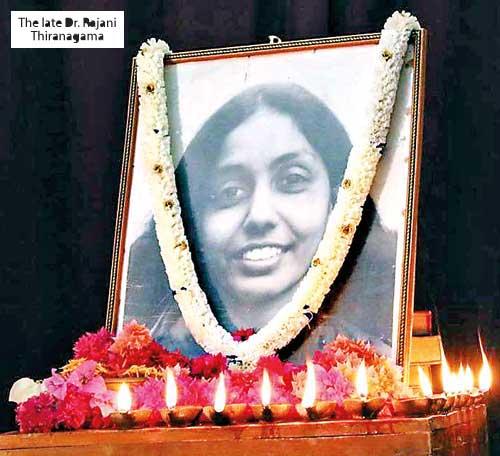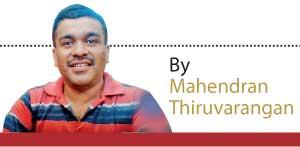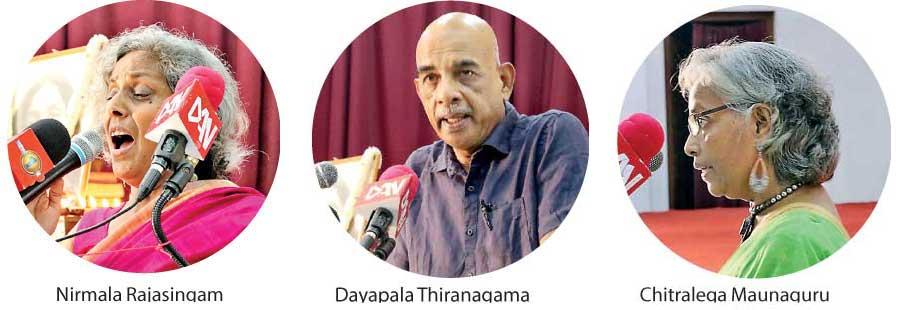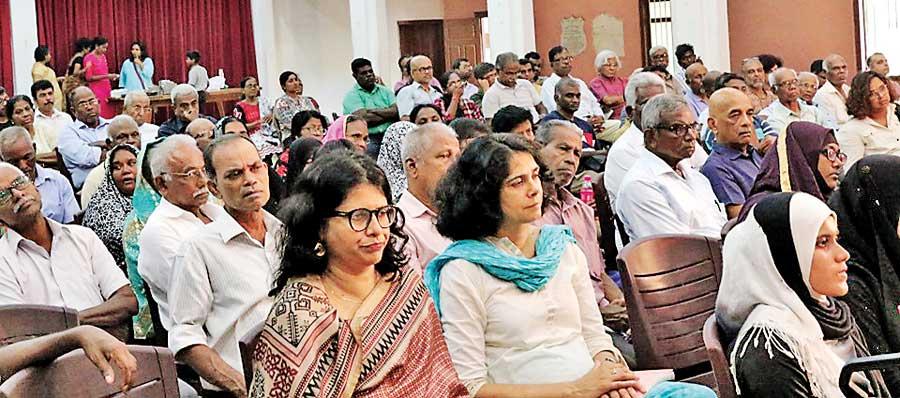Reply To:
Name - Reply Comment
On the evening of September 21, 2019, Trimmer Hall located at the heart of Jaffna town was packed with people. They came not just from Jaffna, but also many other parts of the country  to commemorate the late Dr. Rajani Thiranagama, university academic, human rights activist, mother of two daughters and feminist, assassinated thirty years ago by the Liberation Tigers of Tamil Eelam (LTTE). This emotion-charged event was organised by the Rajani Thiranagama Memorial Committee in collaboration with the Jaffna People’s Forum for Coexistence, the latter a loosely formed collective of religious leaders, academics, journalists, writers, feminists, and social activists from the Hindu, Christian and Muslim communities that consider Jaffna their home. A garlanded portrait of a beamingly smiling Rajani Thiranagama surrounded by oil lamps sat atop a chair placed on the stage.
to commemorate the late Dr. Rajani Thiranagama, university academic, human rights activist, mother of two daughters and feminist, assassinated thirty years ago by the Liberation Tigers of Tamil Eelam (LTTE). This emotion-charged event was organised by the Rajani Thiranagama Memorial Committee in collaboration with the Jaffna People’s Forum for Coexistence, the latter a loosely formed collective of religious leaders, academics, journalists, writers, feminists, and social activists from the Hindu, Christian and Muslim communities that consider Jaffna their home. A garlanded portrait of a beamingly smiling Rajani Thiranagama surrounded by oil lamps sat atop a chair placed on the stage.
Ahilan Kadirgamar, an academic attached to the Department of Sociology at the University of Jaffna, chaired the event. In calling the event to order, Ahilan remembered the invaluable contribution of Rajani Thiranagama and many other activists and social workers during the 1980s to the preservation and protection of human rights at a time when the people of Jaffna had to live under a climate of fear and repression created by the Sri Lankan state, Tamil militant groups including the LTTE and the Indian Peace Keeping Forces. Shifting his focus towards the present and the authoritarian actors that are trying to make a come-back, Ahilan noted that the work done by Rajani, the University Teachers for Human Rights (Jaffna) and others inspire many to combat in a determined manner forces that try to stifle dissent and close off space for democratic action today.
Sitralega Maunaguru, formerly attached to the University of Jaffna and Eastern University of Sri Lanka, recalled the evening of the 21st of September 1989 when Rajani was assassinated and how she, her husband and M. A. Nuhman rushed on three bicycles to Rajani’s place to be with Rajani’s children in their hour of tragedy. Sitralega also reminisced her interactions and collaborations with Rajani at the Women’s Study Circle of the University of Jaffna in the late 1980s. Rajani’s elder sister Nirmala Rajasingam, a political activist based in London, rendered a poem written by S. Sivasegaram immediately after Rajani’s death in 1989 in the form of an evocative song that made many in the audience experience the spirit in which Rajani conducted her activism during the most trying times in Jaffna. Dayapala Thiranagama, Rajani’s husband, remembered in a moving manner his life shared with Rajani and their children and how their marriage itself was an act of crossing many socio-cultural boundaries that divide the people of Sri Lanka.
 The highlight of the event was the Rajani Thiranagama Memorial Lecture delivered by Farzana Haniffa who teaches Sociology at the University of Colombo. Farah’s talk delivered in English was titled “Being Muslim in Sri Lanka Today: Minority Identities and Democratic Space in the Aftermath of the Easter Bombings,” a theme profoundly relevant to our times. The first part of her memorial address focused on the rise of anti-Muslim sentiments during the post-war years and why the frameworks deployed by social leaders and politicians from the Muslim community as well as researchers and analysts to understand the cultural changes that were taking place among the Muslims in a surrounding context of anti-Muslim sentiments could not predict the violence that happened on the Easter Sunday. Farah underscored the manner in which the media, nationalist actors and the middle classes participate in building reductive, homogenizing, chauvinistic narratives that paint all Muslims in the country as Wahhabis and then all Wahhabis as terrorists. Drawing the audience’s attention to the ways in which the longstanding internal contradictions within the Muslim community along lines of class and culture are animated today by the fall out caused by the bombings, Farah emphasized the importance of nuance to our efforts to challenge anti-Muslim racism. She concluded her speech by observing that the increased securitization following the Easter bombings have posed a threat to the democratic space available for not just the Muslims, but also other communities to chart their politics of resistance, and urged all communities to work in solidarity with one another to challenge the forces of oppression and exclusion. The speech was translated into Tamil.
The highlight of the event was the Rajani Thiranagama Memorial Lecture delivered by Farzana Haniffa who teaches Sociology at the University of Colombo. Farah’s talk delivered in English was titled “Being Muslim in Sri Lanka Today: Minority Identities and Democratic Space in the Aftermath of the Easter Bombings,” a theme profoundly relevant to our times. The first part of her memorial address focused on the rise of anti-Muslim sentiments during the post-war years and why the frameworks deployed by social leaders and politicians from the Muslim community as well as researchers and analysts to understand the cultural changes that were taking place among the Muslims in a surrounding context of anti-Muslim sentiments could not predict the violence that happened on the Easter Sunday. Farah underscored the manner in which the media, nationalist actors and the middle classes participate in building reductive, homogenizing, chauvinistic narratives that paint all Muslims in the country as Wahhabis and then all Wahhabis as terrorists. Drawing the audience’s attention to the ways in which the longstanding internal contradictions within the Muslim community along lines of class and culture are animated today by the fall out caused by the bombings, Farah emphasized the importance of nuance to our efforts to challenge anti-Muslim racism. She concluded her speech by observing that the increased securitization following the Easter bombings have posed a threat to the democratic space available for not just the Muslims, but also other communities to chart their politics of resistance, and urged all communities to work in solidarity with one another to challenge the forces of oppression and exclusion. The speech was translated into Tamil.

Farah’s memorial address was followed by the screening of a short film Mubarak Returns to Jaffna by Ashfaque Mohamed. The short film was on the return of the Muslims who were evicted from the north by the LTTE in 1990, to their homes and homelands. As the last event of the evening, Rajan Hoole, a former academic from the University of Jaffna and founding member of the University Teachers for Human Rights (Jaffna) who co-authored The Broken Palmyra in 1989 along with Rajani Thiranagama, K. Sritharan and Daya Somasundaram, spoke about Rajani’s role as intellectual by reflecting upon her writings on the place of women in various Tamil militant movements and her critique of the hegemony of the peninsula Tamils over the Muslims. Sivamohan Sumathy, Rajani’s younger sister and academic attached to the University of Peradeniya, proposed the vote of thanks. At one corner of Trimmer Hall, copies of Negotiating Access to Land in Eastern Sri Lanka, a book co-authored by Shahul H. Hasbullah and Urs Geiser, and Rajan Hoole’s latest book Sri Lanka’s Easter Tragedy: When the Deep State Gets out of Its Depth were displayed for sale.
Attended by activists, writers, academics from the University of Jaffna, religious leaders, members of the Muslim communities in Jaffna, friends and comrades from the South, the memorial event spoke meaningfully about the legacy of resistance that Rajani had left behind, and the significance of her life and work to today’s society and the difficult questions about justice, memory, coexistence and pluralism that we are grappling with at present. Saturday’s event was also a testimony to the inextinguishable glow of dissidence created by Rajani Thiranagama, her activism and her writings. It reminded us that the gunman who cut short her life could not put an end to the spirit that inhabited Rajani and her activism. That spirit connects with us today in powerful ways and shows us new pathways and directions when we are faced with impediments on our quest for a better and more just world.
(Mahendran Thiruvarangan is an academic attached to the University of Jaffna and a member of the Jaffna People’s Forum for Coexistence)

Section of the audience